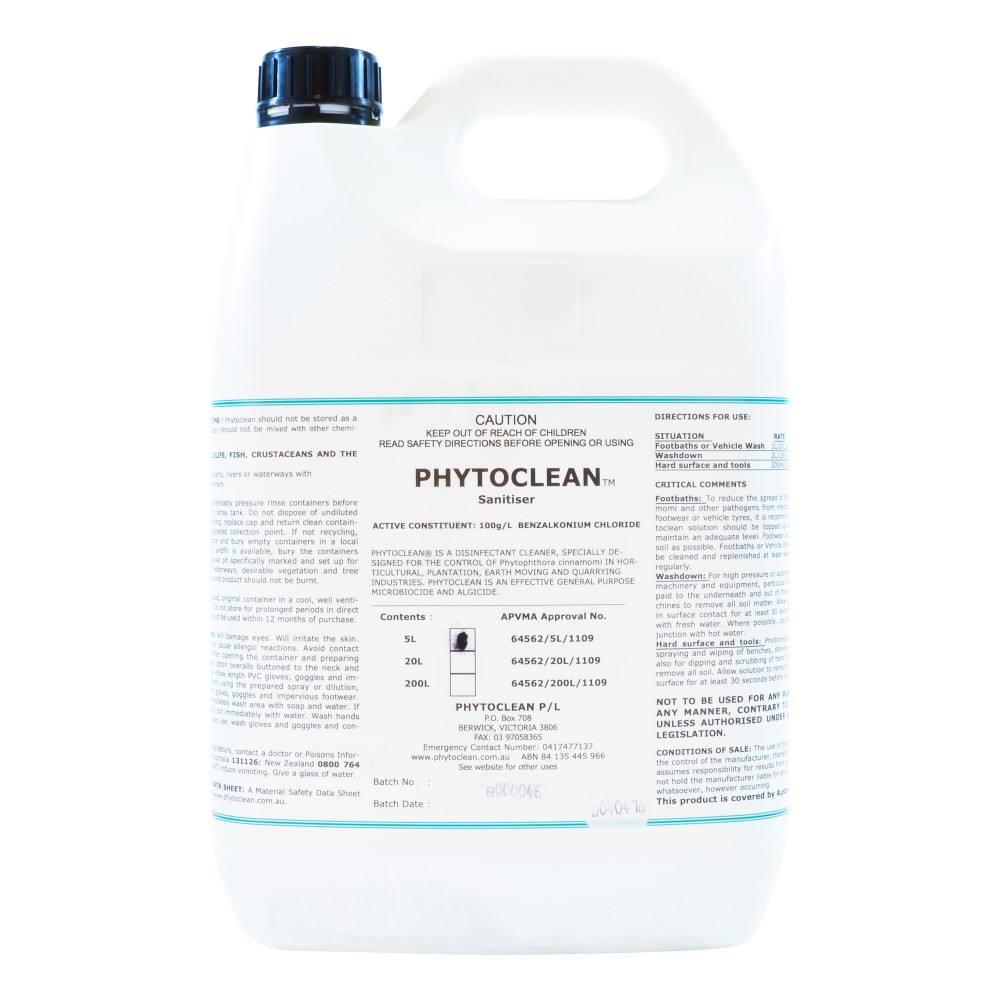Description
THIS PRODUCT: PHYTOCLEAN is a highly effective general purpose micro biocide and algaecide. No need to use those harsh and damaging bleaches or chlorine-based products anymore.
PHYTOCLEAN IS A REVOLUTIONARY NEW DISINFECTANT CLEANER and SANITISER, SPECIALLY FORMULATED FOR THE CONTROL OF Phytophthora Cinnamomi, and similar organisms, in the agriculture, horticultural, plantation, construction and mining industries.
Phytophthora Cinnamomi is a severe soil borne plant pathogen which attacks a wide range of plant species. It is known to cause dieback and death of susceptible plants in native forests, plantations, farms, nurseries, home gardens and food production. It can be a severe threat to plant producers to both the survival of seedlings and to the possibility of contamination of stock passing out of the nursery and into gardens, farms and forests.
A major source of the spread of the disease is via soil adhering to vehicles, machinery and tools and footwear for which adequate hygiene and washdown procedures have not been taken.
With the growing pressure on nurseries to raise their hygiene standards, it has become necessary to produce effective and safer products to kill Fungi and pathogens such as Phytophthora cinnamomi.
Previously, bleaches, sodium hypochlorite, and phenolic based products have been recommended, but have been found to be far less effective and more hazardous than quat based products. In independent testing of four quat based products, Phytoclean was found to be the most effective in inhibiting growth of and killing the fungus when in contact with the chemical. Phytoclean has been used extensively in the Forestry and Agricultural industries in Australia now for more than 10 years.
Other Uses
- Applying to concrete surfaces for control of Fungi and Moss, 2 Litre/10 litre of water.
Phytoclean can be used as an effective Fungi, Moss, Mould and Algae remover. It is safe, non-caustic, non-acidic, bleach-free and biodegradable. - It can be used on a range of exterior surfaces such as decks, paving, masonry walls, footpaths, and it will not affect plants and landscape, but should not be sprayed directly on the foliage if possible.
- General Sanitiser, for Internal Household Surfaces, Animal quarters, Poultry Sheds, 100ml/10 Litre water.
- Phytoclean can be used effectively and safely against a range of organisms that cause odours, mould and mildew, deodorizes those areas that are hard to keep smelling fresh, such as garbage collection areas, rubbish bins, animal and pet enclosures and toilet facilities.
In General: Disinfectant cleaners and sanitizers in agriculture and horticulture are specialized products designed to clean and sanitize various surfaces, equipment, and tools used in farming and gardening. These products help control the spread of pathogens, pests, and diseases, promoting healthier plants and reducing the risk of contamination. Here’s a description of disinfectant cleaners and sanitizers and their common uses in agriculture and horticulture:
Description: Disinfectant cleaners and sanitizers used in agriculture and horticulture are formulated to eliminate or reduce harmful microorganisms, including bacteria, viruses, fungi, and other pathogens that can negatively impact plants and agricultural practices. Key features of these products include:
- Active Ingredients: Disinfectant cleaners and sanitizers can contain various active ingredients, such as quaternary ammonium compounds, hydrogen peroxide, chlorine-based compounds, or organic acids, depending on the intended use and specific pathogens being targeted.
- Formulation: These products come in various formulations, including liquid concentrates, ready-to-use sprays, powders, and granules, allowing flexibility in application methods.
- Safety: Many disinfectant cleaners and sanitizers used in agriculture and horticulture are designed to be safe for use in agricultural settings, without posing harm to plants, animals, or humans when used as directed.
Uses:
- Greenhouse and Nursery Sanitization: In greenhouse and nursery operations, disinfectant cleaners and sanitizers are used to sanitize surfaces, trays, pots, and tools to prevent the spread of plant diseases, fungi, and pests. They help maintain a clean and pathogen-free environment for plant propagation.
- Disease Control: Disinfectants can be applied to surfaces in areas where plant diseases are a concern, such as in orchards, vineyards, and crop fields. This helps prevent the spread of diseases from contaminated equipment and tools.
- Disease Eradication: In cases of disease outbreaks or infestations, disinfectants are used to sanitize affected areas, equipment, and tools to eradicate the pathogens or pests responsible for the problem.
- Tool and Equipment Maintenance: Tools and equipment used in agriculture and horticulture, such as pruning shears, shovels, and plows, can carry pathogens from one plant to another. Regular cleaning and sanitizing of these tools help prevent cross-contamination.
- Seed and Soil Treatments: Some disinfectants are used as seed treatments or soil amendments to control soilborne pathogens and pests, ensuring that plants have a healthy start.
- Livestock Operations: In integrated agricultural systems that include livestock, disinfectants may be used to sanitize areas where animals are housed, reducing the risk of transmitting diseases between livestock and crops.
- Post-Harvest Sanitization: After harvesting, disinfectants may be used to clean and sanitize storage facilities, bins, and equipment to prevent post-harvest contamination and prolong the shelf life of produce.
- Pest Management: In some cases, disinfectants are used to control specific pests, such as soilborne nematodes, by treating the soil or root zone.
Overall: When using disinfectant cleaners and sanitizers in agriculture and horticulture, it’s essential to follow the manufacturer’s instructions for dilution, application methods, and safety precautions. Proper handling and disposal of these products are crucial to ensure they do not harm the environment or pose health risks to humans and animals. Additionally, it’s important to choose products that are labeled for agricultural and horticultural use to ensure they are appropriate for the intended application.


